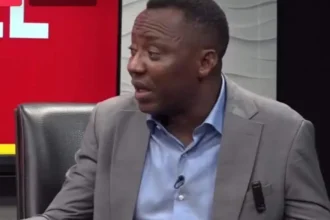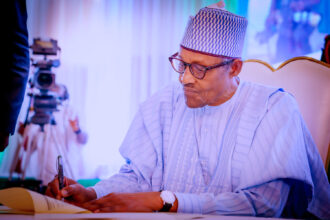...To get all news updates, Join our WhatsApp Group (Click Here)
Also Join our WhatsApp Channel (Click Here)
The Minister of State for Petroleum, Dr. Ibe Kachikwu, appeared before the Senate Committee on Petroleum Resources (Downstream) on Tuesday to give reasons for the acute fuel scarcity across the country and the efforts being made by his ministry to resolve the embarrassing situation.
He regretted the situation and apologised to Nigerians, who he said were really going through difficult moments, and promised that the scarcity would end on or before April 7.
Kachikwu said he would not resign from his position as minister and instead asked those who were threatening to stage a protest in Abuja to save their money because he took the appointment to work for his fatherland.
The minister stated, “I will not resign. I am here to do my job. Those who are planning to stage a protest against me in Abuja should save their fuel money because I have a job to do, and I am committed to doing it well.
“I share the pains of Nigerians. I feel that pain every day. I walk the streets and those who are following my trajectories since I resumed office would see that even on Christmas day, I was at the refineries. On Easter Day, I was in Lagos monitoring fuel distribution at the depots.
“I have given 24/7 attention to the problems in this industry, which are unbelievable. I have continued to work with one sole purpose in mind, which is that every problem will have a solution.”
Kachikwu added, “I do apologise if a comment I make jocularly with my friends in the press about not being a magician offends some Nigerians; it wasn’t meant to be. It is a side jocular issue and I did go ahead to explain what needed to be done. I didn’t intend to create this kind of hyperbole that it did.
“Let me admit that I am not a typically experienced politician. I am a technocrat. Some of the phraseologies that I may use, while being acceptable in the arena in which I play, obviously will not be acceptable in the public political arena. If anybody’s sensitivities were offended by that, I totally apologise.”
He attributed the current petrol scarcity to the refusal by the major oil marketers to import, diversion of the product by marketers, pipeline vandalism, panic buying and non-computerisation of the distribution network to monitor trucks.
The minister lamented that since the payment of N600bn subsidy arrears, which the current administration inherited from the administration of former President Goodluck Jonathan, oil marketers had stopped fuel importation.
The development, he said, had forced the Nigerian National Petroleum Corporation to overstretch its capacity, human resources and facilities in order to bridge the gap, but that the corporation lacked the immediate capacity to handle the task.
Kachikwu said, “Let me put the reasons for the scarcity in three categories. First, when we came in August, this country had arrears of unpaid subsidy claims that were in excess of N600bn, which were not paid for over a year.
“Progressively, over a period of eight months, prior to my coming on board, people had been staying away from importation not at a heavy level, but by about 10 to 15 per cent of allocations were not being met.
“There was hope that ultimately, if the subsidy regime continued, they would get paid; so, some people continued to import, but by the time we came in, people had reached a breaking point and most of the companies didn’t have the liquidity even to go to the banks and open letters of credit, and that became a major issue.”
He said it was obvious that having cleared the N600bn subsidy claims, the country could no longer continue with the subsidy regime owing to dwindling oil revenue and the fact that monumental frauds were being uncovered in the system.
As of January 1 this year, the minister stated that the country was no longer paying subsidy, saving a cumulative amount of over N1tn in a one year period.
Kachikwu noted, “The second major issue was that once the N600bn subsidy money was paid, the ability of the marketers to import the product became a challenge, because they could not raise letters of credit, and up to this point, that still remains a major issue.
“So, even if they wanted to import, they needed letters of credit and adequate foreign exchange cover. Some of them were owing arrears of liabilities as a result of the commitment I had made on petroleum importation.”
As part of efforts to ensure a lasting solution to the problem, he stated that the nation was setting up for the first time strategic reserves of about two million tonnes to provide products always.
He said these would be operational as from May and would contain between five and seven cargos of fuel per reserve.
Kachikwu said, “Once we do that, we should be away from the incessant fuel crisis that we have.
We expect that between now and about the 6th to the 7th of April, the fuel queues will disappear, the DSDP will begin and the foreign exchange allocation will see us smoothly through the track.
“The refineries will be working and the volumes they will be producing will be sent to the strategic reserves to address difficult times. In April, we are expected to get 150 per cent of the volumes that will be needed. A lot of that will go to storage tanks. Hopefully, that should sort out the problem.”
He said privatisation of the refineries remained the best solution to end the fuel crisis in the country.
Source: The Punch
You can get every of our news as soon as they drop on WhatsApp ...To get all news updates, Join our WhatsApp Group (Click Here)
Also Join our WhatsApp Channel (Click Here)









